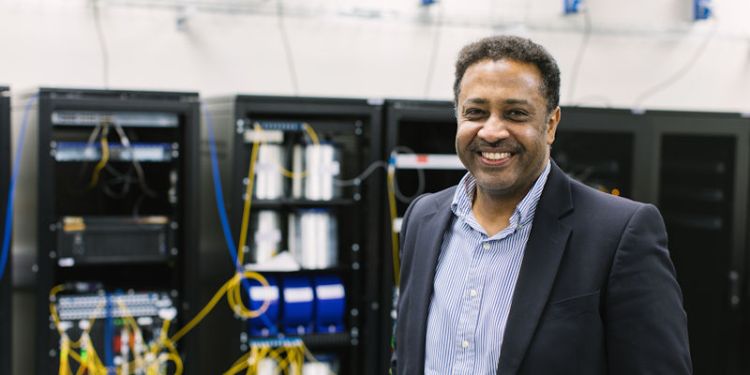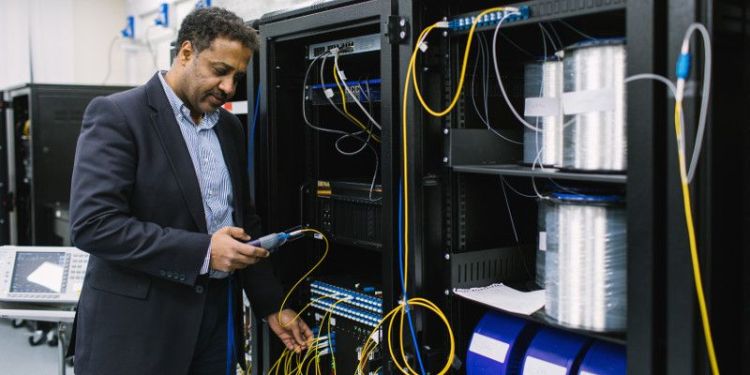Triple success for Professor Jaafar Elmirghani

Professor Jaafar Elmirghani has been awarded the status of Fellow of the Institute of Electrical and Electronic Engineers (IEEE) “for contributions to energy efficient communications".
Professor Jaafar Elmirghani’s seminal work in energy efficiency is being recognised with the award of IEEE Fellow membership – the organisation’s highest membership grade from November 2020, “for contribution to energy efficient communications”.
The total number of Fellows selected in any one year cannot exceed one-tenth of one- percent of the total voting membership. IEEE Fellow is the highest grade of membership, and is an important career achievement widely recognised in the Electrical and Electronics Engineering community.
I am thrilled and honoured that my work and the work of my group has been recognised through the Fellowship of the IEEE.
The Internet and ICT systems currently account for approximately 2% of the world emissions. Traffic in communication networks continues to grow at 30%-40% annually and thus doubles every two years and is projected to grow by a factor of 30x in 10 years and by a factor of 1000x in 20 years leading to significant increase in power consumption which is not sustainable. This led, a decade ago, in 2010, to the 1000x energy efficiency grand challenge set up by the GreenTouch consortium of 50 leading industrial and academic partners led by Nokia Bell Labs.
Through his £6m EPSRC Intelligent Energy Aware Networks (INTERNET) project, the Professor, from the School of Electronic and Electrical Engineering, rose to this challenge. His seminal work in energy efficiency showed how the core network, data centres and content distribution networks can be co-designed to improve their energy efficiency by a factor of 315x.
 This achievement exceeded the target set for these segments of the network, with the balance of the 1000x achieved by the wireless network. He pioneered the optimisation of communication networks for energy minimisation through optimal use of resources, including more recently a wide range of Internet of Things (IoT) and data centre networks. This led to a number of breakthroughs that were used by academia and industry and were incorporated into 5 IEEE standards (IEEE P1925.1, IEEE P1926.1, IEEE P1927.1, IEEE P1928.1 and IEEE P1929.1) based on his work.
This achievement exceeded the target set for these segments of the network, with the balance of the 1000x achieved by the wireless network. He pioneered the optimisation of communication networks for energy minimisation through optimal use of resources, including more recently a wide range of Internet of Things (IoT) and data centre networks. This led to a number of breakthroughs that were used by academia and industry and were incorporated into 5 IEEE standards (IEEE P1925.1, IEEE P1926.1, IEEE P1927.1, IEEE P1928.1 and IEEE P1929.1) based on his work.
His work on the energy efficiency of communication networks was recognised through 6 international awards including 3 IEEE outstanding technical achievement and service awards (2009, 2015, 2020), the 2015 GreenTouch 1000x award, the IET Optoelectronics 2016 Premium Award and the 2016 Edison Award in the collective disruption category with a team of 6 from GreenTouch for their joint work on the GreenMeter. He set up, in 2012, and is Co-Chair of the IEEE Sustainable ICT initiative, a pan IEEE Societies initiative responsible for Green ICT activities across IEEE.
His work on the energy efficiency of data centres led to 4 granted patents and a University of Leeds spin-off company that is currently commercialising his work on the energy efficiency of communication networks.
Professor Elmirghani’s was also recently named among the top 2% of scientists in the world by citations. Using data from Elsevier Scopus, Stanford University created a database that includes the top 2% of scientists in 22 scientific disciplines and 176 sub-domains. The database was published on 16 October 2020, includes data up to 6 May 2020 and “assesses scientists for career-long citation impact up until the end of 2019” and “for citation impact during the single calendar year 2019”. This is further recognition of Professor Elmirghani’s work in the energy efficiency of communication systems and in optical communication systems and networks.
I am grateful to my industrial collaborators, academic collaborators, nominator and supports of my IEEE Fellowship and to my outstanding research group.
Professor Elmirghani’s list of achievement doesn’t stop there. He was invited by the Royal Society with colleagues to prepare a report on the role of digital technologies in achieving net zero emissions. The influential report: “Digital technology and the planet: Harnessing computing to achieve net zero” was published on 3 December 2020.
Digital Technologies can help the UK achieve about one third of the 50% carbon emission reduction it needs to make by 2030. In 2021 the UK will assume the presidency of the G7 and will host COP26. Leading the global response to climate change through digital technologies is the context of this report at a critical point when the UK is leading the world effort.
Professor Elmirghani said: “I am thrilled that my work and the work of my group was recognised through the Fellowship of the IEEE, through the highly cited recognition and through the invitation to co-author the highly influential Royal Society report on Digital Technologies and the planet”. “I am grateful to my industrial collaborators, academic collaborators, nominator and supports of my IEEE Fellowship and to my outstanding research group”.
The report made 11 recommendations including a digital data led transition to net zero, governed use of data, secure and resilient systems to monitor energy efficiency and carbon emissions (involving Defra, DCMS and BEIS in the UK). It also recommended promoting the use of renewable energy in communication and computing systems, as well as developing new methods for energy proportionality in communication and computing systems. In terms of skills it suggested rebuilding and transforming the post COVID-19 economy towards a net zero economy including the development of skills in data analysis and the development of computing and communications as infrastructure for the planet. Finally, it proposed setting up challenge funds for research and innovation towards net zero covering digital technologies, AI, regulatory frame works and standards.
The report was widely publicised in news media outlets, including for example the BBC: “Ditch high definition and new tech to fight climate change”.
Professor. Elmirghani is Fellow of the Institution of Engineering and Technology (IET), Fellow of the Institute of Physics (IoP), and Director of the Institute of Communication and Power Networks in the University of Leeds. He has provided outstanding leadership in a number of large research projects, secured over £30m in grants and is currently the PI of the EPSRC £6.6m Terabit Bidirectional Multi-user Optical Wireless System (TOWS) for 6G LiFi, 2019-2024.
Further related information:
The IEEE is the world’s leading professional association for advancing technology for humanity. Through its 400,000 plus members in 160 countries, the association is a leading authority on a wide variety of areas ranging from aerospace systems, computers and telecommunications to biomedical engineering, electric power and consumer electronics. If you would like to learn more about IEEE or the IEEE Fellow Program, please visit the website.
The Royal Society’s fundamental purpose, reflected in its founding Charters of the 1660s, is to recognise, promote, and support excellence in science and to encourage the development and use of science for the benefit of humanity. The Society has played a part in some of the most fundamental, significant, and life-changing discoveries in scientific history and Royal Society scientists continue to make outstanding contributions to science in many research areas. To learn more about the Society, please visit the website.




